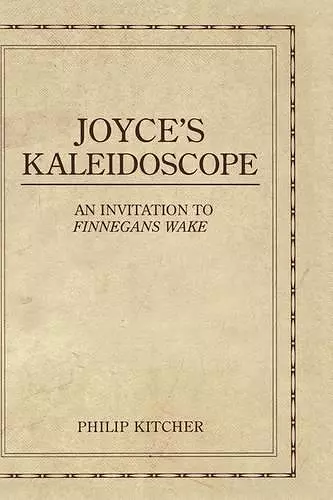Joyce's Kaleidoscope
An Invitation to Finnegans Wake
Format:Hardback
Publisher:Oxford University Press Inc
Published:23rd Aug '07
Currently unavailable, currently targeted to be due back around 1st February 2025, but could change
This hardback is available in another edition too:
- Paperback£32.49(9780195321036)

James Joyce's Ulysses, once regarded as obscure and obscene, is now viewed as one of the masterpieces of world literature. Yet Joyce's final novel, Finnegans Wake, to which he devoted seventeen years, remains virtually unread, except by scholarly specialists. Its linguistic novelties, apparently based on an immense learning that few can share, make it appear impenetrable. Joyce's Kaleidoscope attempts to dissolve the darkness and to invite lovers of literature to engage with Finnegans Wake. Philip Kitcher proposes that the Wake has at its core an age-old philosophical question, "What makes a life worth living?", and that Joyce explores that question from the perspective of someone who feels that a long life is now ending. So the complex dream language is a way of investigating issues that are hard to face directly; the reader is invited to struggle with the novel's aging dreamer who seeks reassurance about the worth of what he has done and been. Joyce finds his way to reassurance. The sweeping music and the high comedy of Finnegans Wake celebrate the ordinary doings of ordinary people. With great humanity and a distinctive brand of humanism, Joyce points us to the things that matter in our lives. His final novel is a festival of life itself. From this perspective, the supposedly opaque, or nonsensical, language opens up as a rich source for the reader's reflections: though readers won't all approach it the same way, or with the same set of references, there is meaning in it for everyone. Kitcher's detailed study of the entire text brings out its musical resonances and its musical structures. It analyzes the novel overall while bringing deep insight to the reading of key individual passages. This engaging guide will aid readers not just to make sense of the novel, but to relish the remarkable accomplishment of Joyce's least appreciated work.
Philip Kitcher is just the person we need to rein in a virtuoso performance that threatens at every turn to spin out of control. There's no novel more in need of, and more worthy of, a philosophical perspective, and Kitcher, himself a virtuoso devotee of literature, will henceforth have provided Joyce's summa its firm foundation. * Paul Fry, Yale University *
In this stellar book, Karen Zivi realigns the theorization of rights with 'agonistic' theories of democracy that have put traditional liberalisms under scrutiny. Using Judith Butler's concept of 'performativity' she takes issue with Wendy Brown's critique of 'rights-politics,' writing in very clear language and deploying intriguing and controversial case studies. Unusually, Zivi starts the story with a pertinent and easy-to-read survey of the analytical tradition of rights-analysis begun in the 1960s. This is an invaluable work on the most important topics today in political theory and practice. * Terrell Carver, Professor of Political Theory, University of Bristol *
This book performs the remarkable feat of making the pleasures of Finnegans Wake enticing to the general reader. Philip Kitcher shows that Joyce's last masterpiece, rather than an esoteric word game, is a heartwarming portrait of the aging artist in his family, as sad and funny as the portrait of Leopold Bloom in Ulysses. An irresistible invitation to Finnegans Wake, Joyce's Kaleidoscope also appeals to experienced readers by illuminating the humanity of Joyce's vision. * Maud Ellmann, University of Notre Dame *
Kitcher begins Joyce's Kaleidoscope by asking the right question: not 'What does each word mean?' but 'What meaning does our experience of reading convey?' This will find an elegant and satisfactory answer if we accept this invitation to a spiraling tour of the book. The 'passkey' has been given, just 'mind your hats goan in!' * Jean-Michel Rabate, Princeton University *
Kitcher begins Joyce's Kaleidoscope by asking the right question: not 'What does each word mean?' but 'What meaning does our experience of reading convey?' This will find an elegant and satisfactory answer if we accept this invitation to a spiraling tour of the book. The 'passkey' has been given, just 'mind your hats goan in!' * Jean-Michel Rabate, Princeton University *
ISBN: 9780195321029
Dimensions: 238mm x 166mm x 24mm
Weight: 617g
336 pages